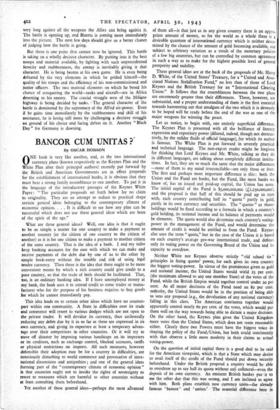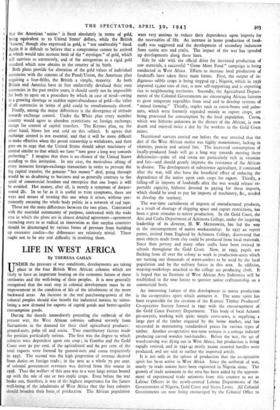BANCOR CUM UNITAS ?.
By OSCAR HOBSON What are these general ideas? Well, one idea is that it ought to be as simple a matter for one country to make a payment to another country (or the citizen of one country to the citizen of another) as it is for one citizen to make a payment to another citizen of the same country. That is the idea of a bank. I and my tailor keep banking accounts for the ease with which we can make and receive payments of the debt due by one of us to the other by simple book-entry without the trouble and risk of using legal tender currency. Then there is the idea that there ought to be more convenient means by which a rich country could give credit to a poor country, so that the trade of both should be facilitated. That, too, is an ordinary banking idea. If I have unemployed money at my bank, the bank uses it to extend credit to some trader or manu- facturer who for the purpose of his business requires to buy goods for which he cannot immediately pay.
This idea leads on to certain other ideas which have no counter- part within one community. A State in difficulties over its trade and commerce will resort to various dodges which are not open to the private trader. It will devalue its currency, thus unilaterally reducing any debts due by it in so far as these are expressed in its own currency, and giving its exporters at least a temporary advan- tage over their competitors in other countries. Or it will try to stave off disaster by imposing various handicaps on its importers or its creditors, such as exchange control, blocked accounts, tariffs or physical restrictions on imports. All such measures, however defensible their adoption may be for a country in difficulties, are notoriously disturbing to world commerce and provocative of inter- national dissensions and antipathies ; and one of the general ideas forming part of the "contemporary climate of economic opinion " is that countries ought not to invoke the rights of sovereignty to resort to measures which are harmful to other countries without at least. consulting them beforehand.
Yet another of these general ideas—perhaps the most advanced of them all—is that just as in any given country there is an appro- priate amount of money, so for the world as a whole there is a desirable quantum of international currency which is neither deter- mined by the chance of the amount of gold becoming available, nor subject to arbitrary variation as a result of the monetary policies of a few big countries, but can be controlled by common agreement in such a way as to make for the highest possible level of general prosperity and stability.
These general ideas are at the back of the proposals of Mr. Harry D. White, of the United States' Treasury, for a "United and Asso- ciated Nations Stabilisation Fund," no less than of those of Lord Keynes and the British Treasury for an " International Clearing Union." It follows that the resemblances between the two plans are enormously greater than their differences. These, however, are substantial, and a proper understanding of them is the first essential towards hammering out that amalgam of the two which it is devoutly to be hoped will be ready before the end of the war as one of the major weapons for winning the peace.
Let us notice, to begin with, one entirely superficial difference. The Keynes Plan is presented with all the brilliance of literary expression and expository power (diluted, indeed, though not destruc- tively, by the milder fluids of official language), for which its author is famous. The White Plan is put forward in severely practical and technical language. The non-expert reader might be forgiven for thinking that Lord Keynes and Mr. White, talking as they do in different languages, are talking about completely different institu- tions. In fact, they are so much the same that the major differences —none of them to my mind irreconcilable—are only three or four. The first and perhaps most important difference is this: both the Union and the Fund are banks, but the Fund, like most banks we know of, has an issued and paid-up capital, the Union has none. The initial capital of the Fund is $5,000,000,000 (L1,25o,000,000), and the proposal is that half of this should be paid up to start with, each country contributing half its " quota" partly in gold, partly in its own currency and securities. The " quotas " or share- holdings would be fixed according to a formula in which a country's gold holding, its national income and its balance of payments would be elements. The quota would also determine each country's voting- power in the management of the Fund, and would determine the amount of credit it would be entitled to from the Fund. Keynes also uses the term " quota," but in the case of the Union it is based on each country's average pre-war international trade, and defines only its voting power on the Governing Board of the Union and its capacity to overdraw.
Neither White nor Keynes observe strictly "old school tie" principles in fixing quotas' power, for each gives its own country the biggest voting-power. In virtue of the prominence given to gold and national income, the United States would wield 25 per cent. (the maximum allowed to any one member State) of the votes of the Fund, while the British Empire would together control under 20 per cent. As all major decisions of the Fund need an So per cent. majority, the United States would be in the position of being able to veto any proposal (e.g., the devaluation of any national currency) falling in this class. The American continents together would apparently control nearly 6o per cent. of the votes, which would put them well on the way towards being able to dictate a major decision. On the other hand, the Keynes plan gives the United Kingdom more votes than the United States, which does not seem reasonable either. Clearly these two Powers must have the biggest voice in shaping the policy of the Fund/Union, but both could consistently with that observe a little more modesty in their claims to actual voting-power.
On the question of initial capital there is a good deal to be said for the American viewpoint, which is that a State which may desire to avail itself of the credit of the Fund should put down security beforehand. Under the British proposal a country would be able to overdraw up to say half its quota without any collateral—even the deposit of its own currency. An eminent British banker put it to me the other day that this was wrong, and I am inclined to agree with him. Both plans establish new currency units—the already famous banoor ' and 'unitas.' The essential difference here is that the American `unitas' is fixed absolutely in terms of gold, being equivalent to to United States' dollars, while the British `bancor,' though also expressed in gold, is "not unalterably" fixed. Again it is difficult to believe that a compromise cannot be arrived at which would take account both of the "mystique" of gold, which still survives so extensively, and of the antagonism to a rigid gold standard which now obtains in the country of its birth.
Both plans provide for alteration of the gold values of individual currencies with the consent of the Fund/Union, the American plan requiring a four-fifths, the British a simple, majority. As both Britain and America have in fact unilaterally devalued their own currencies in the past twelve years, it should surely not be impossible for both to agree on a procedure by which in case of need—owing to a growing shortage or sudden super-abundance of gold—the value of all currencies in terms of gold could be simultaneously altered.
Finally, among the major differences is the divergence of attitude towards exchange control. Under the White plan every member country would agree to abandon restrictions on foreign exchange, except for control of capital transfers. The Keynes plan, on the other hand, blows hot and cold on this subject. It agrees that exchange control is not essential, and that it will be more difficult to make effective when the postal censorship is withdrawn, and then goes on to urge that the United States should adopt machinery of control similar to that which we have "now gone a long way towards perfecting." I imagine that there is no chance of the United States acceding to this invitation. In any case, the meticulous sifting of every innocent foreign-exchange transaction in order to prevent the big capital transfer, the genuine "hot money" deal, going through would be so deadening to business and so generally contrary to the spirit of commercial freedom and enterprise that one hopes it will be avoided. Hot money, after all, is merely a symptom of deeper- seated ills. In so far as it is useful to treat symptoms, there are ways and means of treating this one when it arises, without per- manently encasing the whole body politic in a network of red tape.
These are the main differences between the two plans. Contrasted with the essential community of purpose, contrasted with the wide area in which the plans are in almost detailed agreement—agreement extending even to so radical an innovation as that surplus countries should be discouraged by various forms of pressure from building up excessive credits—the differences are relatively trivial. There ought not to be any real difficulty in resolving them.























 Previous page
Previous page